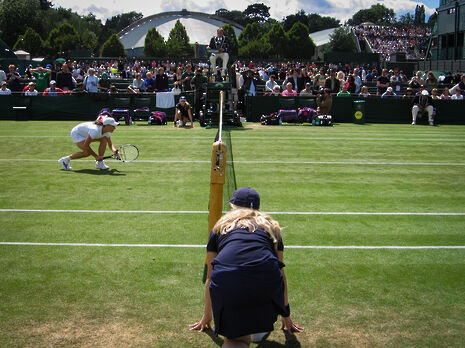Judy Murray: ‘sport will always be there when the exams are over’
The household tennis name on university sport, access and dealing with the media spotlight

Judy Murray has shown a lifelong commitment to the tennis court. Originally a professional player herself, she is now a successful coach and of course, mother to two of British tennis’ greatest names – Jamie and Andy Murray. She has used her experience gained through playing and watching the boys growing up to give back to the sport.
When asked about the secret to success in sport, Murray says that passion for the game, having fun in training and bonding well with teammates are of primary importance. She emphasises the value of being open-minded and letting players learn to play tennis through match-based experience.
One of the most important factors as a coach is not to get too caught up in the technical details, she insists. Tennis players cannot always have a perfect technique, but they stand more chance of winning if they learn to adapt to each opponent’s playing style.
Anyone can achieve in sport, whether it be international victories or Cambridge Cuppers glory
Murray sings the praises of the value of university sport as sociable, inexpensive and an amazing opportunity to give new things a try: “the opportunities that sport brings are the best”.
A talented athlete, she thrived at Edinburgh University where she took up squash and competed in tennis at the World Student Games. For all Cambridge students who strive for a place on an international podium, Murray stresses the importance of balancing sport with studying: “After all, sport will always be there when the exams are over!” Sport compliments learning, brings a new dimension to student life and introduces you to great people. The advocates strongly the importance of “keeping sport rolling” at times when the stresses of life can easily take over.It’s valuable advice, perhaps, for those of us overwhelmed by revision at the moment.
Consistency and commitment to sport in young women is one of her main concerns. The numbers show that girls are increasingly likely to drop out of sport as they grow through adolescence. By ensuring that there are positive female role models for young female athletes, be they players or coaches, girls should continue to feel encouraged to participate, Murray claims.
She explains her own experiences and struggles of being in the minority as a female coach on a male-dominated circuit. She realised the extent of the prejudices against women in coaching on a training course, when, out of the 20 places on the course, only two were given to women. To make matters worse, the instructor told her there had been a complaint from an unsuccessful male applicant that she had even been selected in the first place.
She now highlights the importance of developing career pathways for women in sport with stable starting wages. Investment in women’s sport is clearly starting to pay off, not least shown by the recent inspirational success of England’s Commonwealth netball team. Nevertheless, “We can’t take our foot off the gas. Women’s sport is moving in the right direction, and our generation needs to keep it that way.”
The media spotlight has been hard. She has sought to transform her image from stern mother with ‘wobbling bingo wings’ (when caught clapping on camera), to a female idol, Strictly Come Dancing superstar and household name. Dealing with the attention was “a massive learning curve”, but something Murray seems not only to have taken on board but thoroughly embraced.
She would like to leave a legacy, particularly for sport in Scotland. 50 days each year, she travels around the country in her campervan to give coaching sessions to as many young people as she can. In the end she would like to set up a sport centre in Dunblane, her hometown, which would provide access to indoor tennis courts at a low cost to give everyone a chance to play the game.
Since her own children have been involved in competitive sport from a young age, I ask if universities should play a greater role in fostering talent in late developers, especially for those who don’t have the same opportunities as youngsters. She claims that “all sports have a pathway” but that the most important thing is to keep creating opportunities, including at university.
As her own sons’ modest background of growing up playing on rain-sodden grass courts in not-so-sunny Scotland shows, these opportunities are not created by facilities or equipment or expensive investments; the support these players receive from their family and coaches is vital. Perhaps, with the right attitude to training, anyone can achieve in sport, whether it be international victories or Cambridge cuppers glory.
 Features / Should I stay or should I go? Cambridge students and alumni reflect on how their memories stay with them15 December 2025
Features / Should I stay or should I go? Cambridge students and alumni reflect on how their memories stay with them15 December 2025 News / Dons warn PM about Vet School closure16 December 2025
News / Dons warn PM about Vet School closure16 December 2025 News / Cambridge study finds students learn better with notes than AI13 December 2025
News / Cambridge study finds students learn better with notes than AI13 December 2025 News / SU reluctantly registers controversial women’s soc18 December 2025
News / SU reluctantly registers controversial women’s soc18 December 2025 News / News In Brief: Michaelmas marriages, monogamous mammals, and messaging manipulation15 December 2025
News / News In Brief: Michaelmas marriages, monogamous mammals, and messaging manipulation15 December 2025









